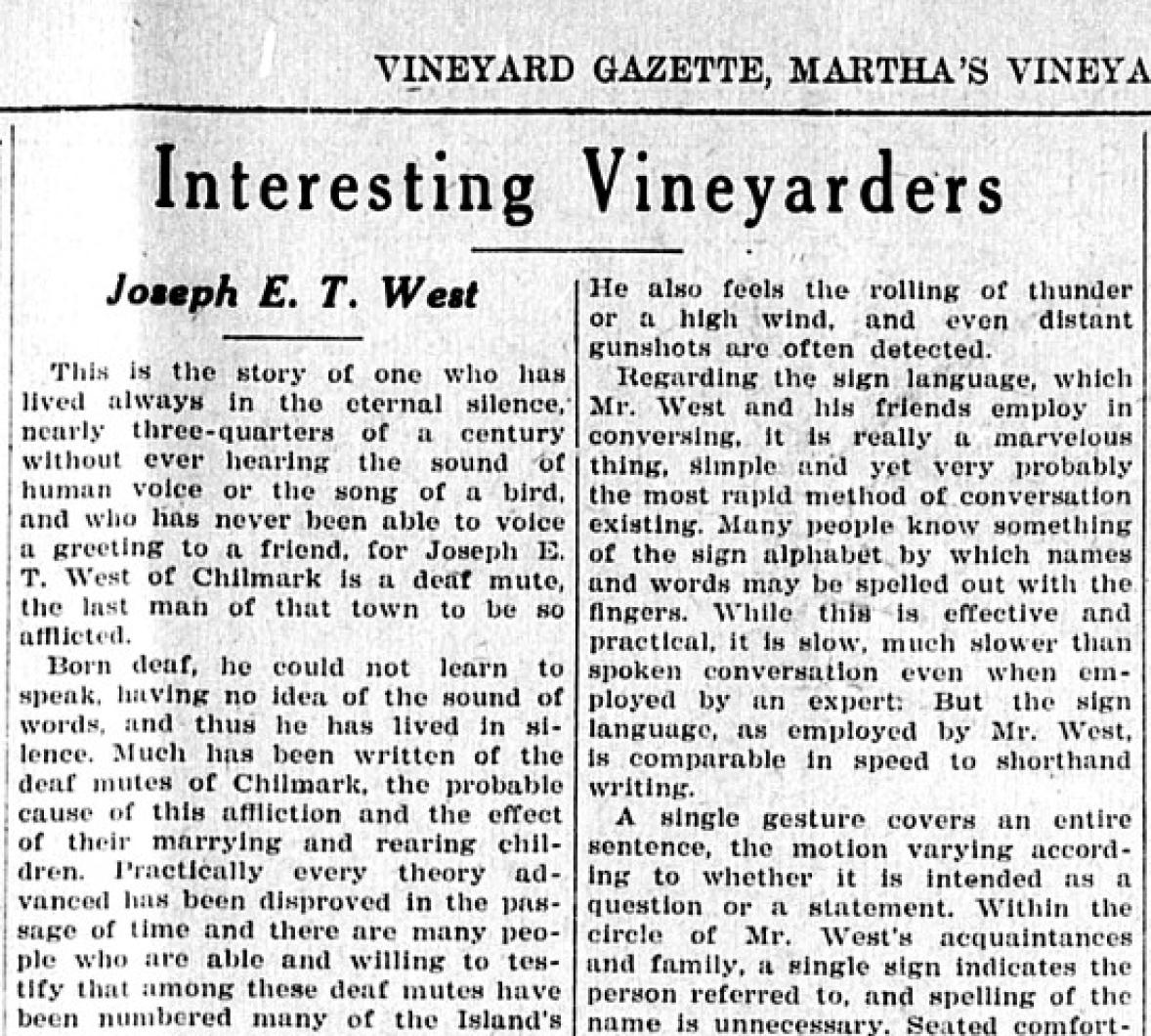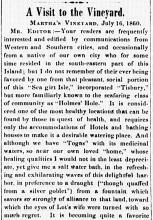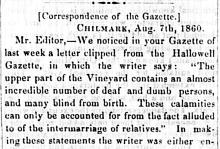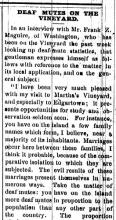This is the story of one who has lived always in the eternal silence, nearly three-quarters of a century without ever hearing the sound of human voice or the song of a bird, and who has never been able to voice a greeting to a friend, for Joseph E. T. West of Chilmark is a deaf mute, the last man of that town to be so afflicted.
Born deaf, he could not learn to speak, having no idea of the sound of words, and thus he has lived in silence. Much has been written of the deaf mutes of Chilmark, the probable cause of this affliction and the effect of their marrying and rearing children. Practically every theory advanced has been disproved in the passage of time and there are many people who are able and willing to testify that among these deaf mutes have been numbered many of the Island’s most upright and valued citizens.
There were a considerable number of deaf and dumb people in Chilmark during Mr. West’s boyhood, and this fact no doubt made his life much less lonely than would have been the case had he been alone in his affliction. He had both brothers and sisters who were deaf like himself, and also those who could speak and hear perfectly. There were numerous others, children and adults, and because of their number there were very few people in the town who could not converse readily in the sign language.
Born on Farm He Cultivates
Mr. West was born on a farm, the same farm upon which he lives today, and here he has spent his life, for his leaning was all toward the raising of stock and agriculture, and throughout the vigorous years of his life has cultivated his fields and tended his cattle and sheep. As a farmer, his efforts have been generally successful, and great crops have filled the old-fashioned barn each autumn time.
Strangers, seeing a deaf and dumb man but seldom, have often expressed a curiosity as to how such men could perform the work of normal men, and have been horrified at the thought that they might venture far from home unattended. Such ideas are amusing to Mr. West, who, like others similarly affected, has always travelled freely and worked at whatever tasks presented themselves about his farm and home, or elsewhere. He has experienced no difficulty whatever, and, indeed, in some respects he has enjoyed a distinct advantage over his associates who can hear and speak.
By the wise provision of nature or Providence, the crippling or destruction of one faculty usually strengthens certain others and makes them more active. Thus, while Mr. West has never been able to hear the voice of instruction, his power of observation has been intensely keen, and having once noted how a thing was done, no detail ever escaped his memory.
Then, too, this same lack of hearing has tended to sharpen his faculties until he can actually feel sound, and with these increased faculties he has gone through life without missing much of interest or enjoyment as others know them.
Training accustomed his horses and cattle to obey at the sound of the pursing of the lips or a light touch of the reins, and while at work in his fields or driving on the highways, nothing unusual in the behavior of the animals is noticeable. In connection with this matter, it is generally recognized that the domestic animals put more trust in a deaf mute than in the average person. The horse, dog or cow appears to take more interest in the activities of its master, watching his movements and quietly and willingly moving as he directs.
On the highway, where cars whiz past every other minute, Mr. West practices safety by driving on the proper side of the road. The cars or vehicles approaching from in front are thus given sufficient room in which to pass. But he always knows when a car is approaching from the rear. At the sound of a motor, his horse will invariable make a slight motion with its ears which Mr. west has learned to watch for through long experience, and he turns out, if necessary.
What He Can “Hear”
Any jar, however light, attracts his attention instantly. A step on the floor or ground, the dropping of a person’s hand to a table-top, and even the raising of the voice, inside a building, creates a vibration that he can feel. He also feels the rolling of thunder or a high wind, and even distant gunshots are often detected.
Regarding the sign language, which Mr. West and his friends employ in conversing, it is really a marvelous thing, simple and yet very probably the most rapid method of conversation existing. Many people know something of the sign alphabet by which names and words may be spelled out with the fingers. While this is effective and practical, it is slow, much slower than spoken conversation even when employed by an expert. But the sign language, as employed by Mr. West, is comparable in speed to shorthand writing.
A single gesture covers an entire sentence, the motion varying according to whether it is intended as a question or a statement. Within the circle of Mr. West’s acquaintances and family, a single sign indicates the person referred to, and spelling of the name is unnecessary. Seated comfortably, smoking his pipe by the fireside, Mr. West will converse or tell stories with his hands, moving them but slightly, and without exertion.
This sign language is often used in conversing at long distances, both by deaf mutes and others who find it a convenience. Raising the arms until they stand out from the body or above the head, Mr. West and his wife, for instance, can carry on a conversation at a distance far beyond the range of the human voice.
An interesting demonstration of the use of the sign language was formerly a common sight at the village prayer meetings. Mr. West, like all his family, has always been a regular attendant at religious services and on such occasions as prayer meetings, the members of his family “spoke” or offered prayer as others did. In order that the congregation might know what they “said,” it was customary for them to walk to the front of the room, where they would offer up their adorations in the sign language. Age and increasing infirmity prevent Mr. West from attending such services as frequently as he formerly did, but he has never ceased to give thanks for those things of life that Providence has allowed him to enjoy.
Indeed, it sometimes appears that in spite of the affliction that excites the pity of all who know him, he has been able to get more out of life than the average normal person. He has the keenest appreciation of the beauties of nature. He loves a joke and is quick to see it.
Master of many occupations, the buildings and equipment about his place show the evidence of his handiwork, and with over seventy years behind him he still works on, his tall, spare frame unbent by time and toil, his eyes keen and observant, his memory unfailing. And his hands, those hands that have toiled since childhood, are still flexible from constant employment in conversation.











Comments